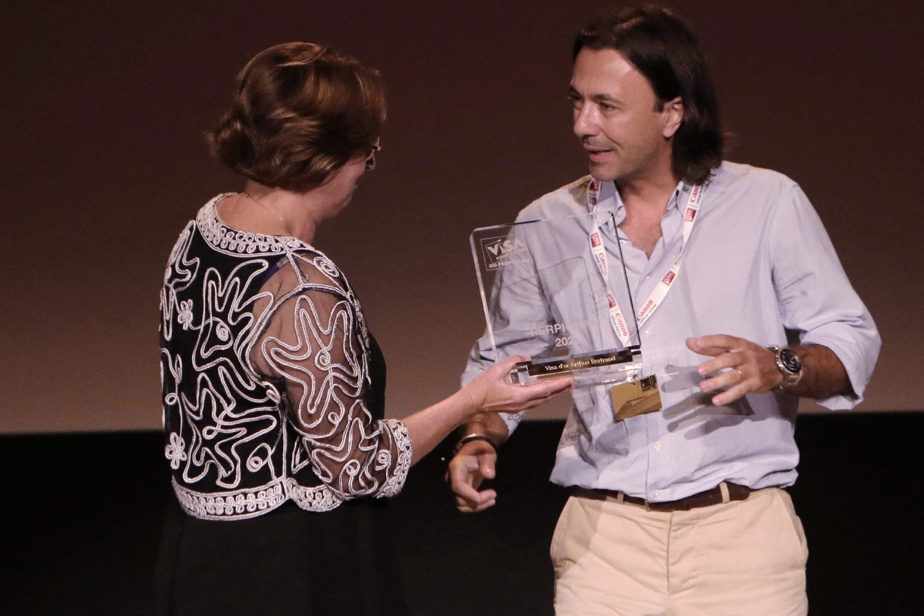(Perpignan) The Visa d’or News, the most prestigious prize of the Visa pour l’image international photojournalism festival, was awarded in Perpignan on Saturday to Siegfried Modola, for his work on the Karen rebellion against the Burmese junta.
Siegfried Modola, an Italian-British photographer, first thanked “the people who allowed us to tell their stories” in this report entitled “The armed revolution in Burma”, which took two years of work and was published by the World
Other nominees were Michael Bunel (Le Pictorium) for “Search, Rescue and Protect,” about the work of NGOs rescuing people in exile crossing the Mediterranean, and Tyler Hicks (The New York Times) for “Bakhmout, a City at War “, in Ukraine.
Last year, the Visa d’or News rewarded Ukrainian photographer Evgeniy Maloletka (Associated Press, AP) for his reporting in bombed-out Mariupol.
Burma had already been in 2021 at the heart of the Visa d’or News which, for the first time, had rewarded a photographer who remained anonymous for security, for his images of “The Spring Revolution” in his country.
This 35th edition of Visa highlighted the impact of human activity on the planet and the climate, the theme of numerous exhibitions, but also the perilous routes of exile and therefore Ukraine.
Tyler Hicks received the Golden Visa from the daily press for his work in Bakhmut, a city emblematic of Ukrainian resistance to the invasion by Russia.
And the France Info digital information Golden Visa went to Virginie Nguyen Hoang for her web documentary Life under the fire of war on the daily lives of Ukrainians, broadcast by Libre Belgique.
Ebrahim Noroozi’s (AP) work in Afghanistan, titled “The Saddest Country in the World and the Worst Country for Women,” received the Visa d’or magazine.
The Humanitarian Golden Visa from the International Committee of the Red Cross (ICRC) rewarded Federico Rios Escobar for his reports, published in the NYT, on the hell of Darién, an inextricable jungle between Colombia and Panama, through which migrants wanting to reach the United States.
The Honorary Visa d’Or from Figaro Magazine, honoring the career of an active photographer, distinguished Noël Quidu, who since the 1980s has covered multiple conflicts.
The Golden Visa of the City of Perpignan/Rémi Ochlik went to Emily Garthwaite (Institute) for “Didjla: journey along the Tigris”, in Iraq.
Among other awards and scholarships, the Carmignac Prize recognized the work of Anas Aremeyaw Anas, Muntaka Chasant and Bénédicte Kurzen (Noor) on Ghana facing the ecological and human impact of the flow of electronic waste.
The Yves Rocher Foundation prize went to Gaël Turine, for his project on sacred forests in Benin and Nigeria, while the ANI-PixTrakk prize rewarded Karine Pierre’s photos on the caïd of the Ghobeiry district, in Lebanon .
Cinzia Canneri for her part received the Camille Lepage prize in order to continue her work on the violence inflicted on women in Tigray and Eritrea, and Paolo Manzo the Pierre
The SAIF/Benoit Schaeffer Fellowship for Photographic Publishing went to Alfred Yaghobzadeh, who is preparing his first monograph.
Finally, the Canon grant for female photojournalists was awarded to Anastasia Taylor-Lind, the grant for new urban photography supported by Google to Valentin Goppel, and the Canon grant for documentary video-short film to Juan Vicente Manrique Gomez.
The festival also focused on the revolts in Iran with, for the first time, a collective exhibition of anonymous people because “it is no longer possible to work”, to identify yourself as a photographer in this country, specified its director, Jean-François Leroy, to AFP.
Visa, which began on September 2, offered free screenings, meetings with photographers and discussions during this professional week. Its 24 exhibitions remain open to the public until the 17th.
